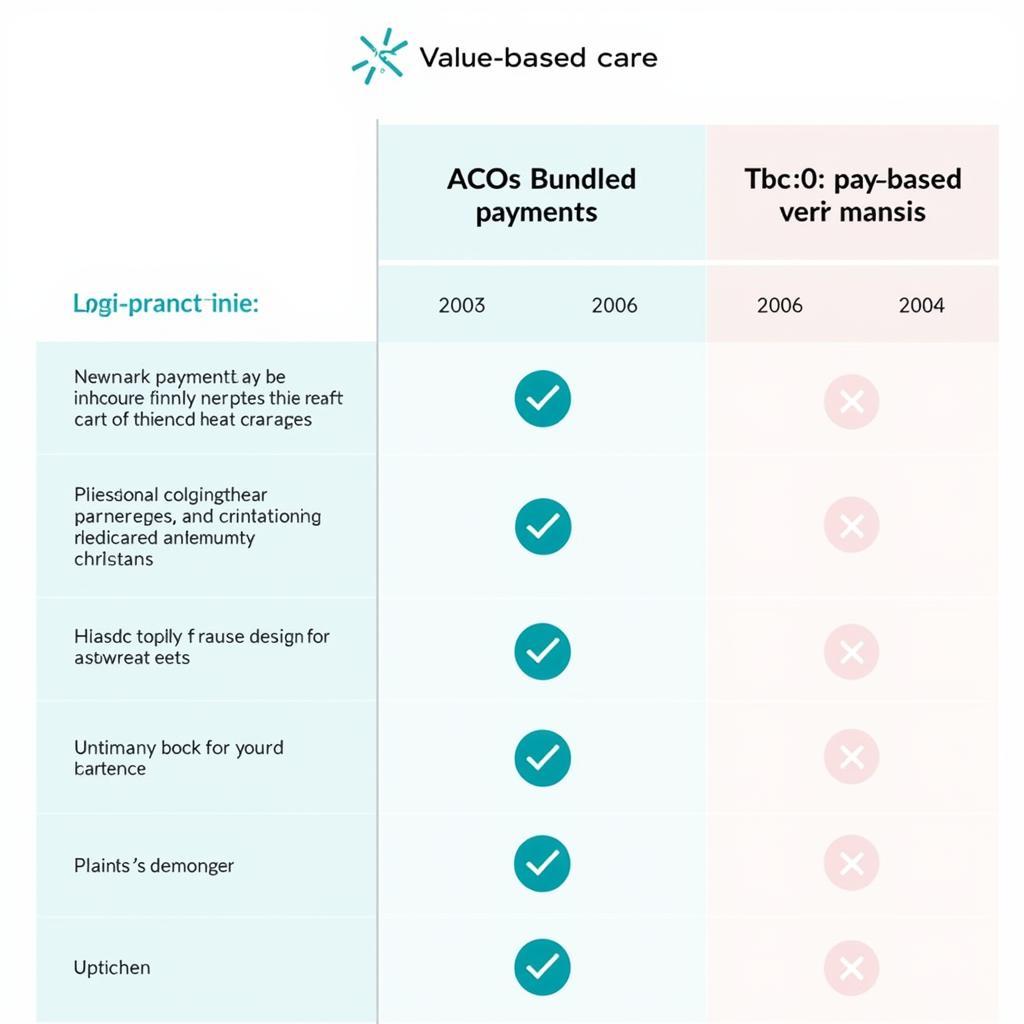What Replaced Fee-for-Service Medical Care?
Fee-for-service medical care, once the dominant model in healthcare, has largely been replaced by alternative payment models. This shift reflects a growing need to address the inefficiencies and rising costs associated with the traditional system. But what exactly are these new models, and how do they impact both patients and providers?
 Alternative Payment Models in Healthcare
Alternative Payment Models in Healthcare
Understanding Fee-for-Service and Its Limitations
Under the fee-for-service model, healthcare providers billed separately for each service provided, such as consultations, tests, and procedures. While this approach offered a sense of transparency, it often incentivized a higher volume of services, regardless of their necessity. This could lead to:
- Overutilization of Healthcare Resources: Providers might order unnecessary tests or procedures to increase revenue.
- Fragmented Care: Patients could receive disjointed care from various specialists without proper coordination.
- Escalating Healthcare Costs: The focus on quantity over quality contributed to the overall rise in healthcare expenditures.
The Rise of Value-Based Care
The limitations of fee-for-service paved the way for value-based care models, which prioritize patient outcomes and cost-effectiveness. Instead of rewarding the quantity of services, these models incentivize providers to deliver high-quality care that improves patient health.
Key Features of Value-Based Care:
- Focus on Outcomes: Providers are evaluated and reimbursed based on patient health improvements, satisfaction, and experience.
- Coordinated Care: Emphasis is placed on seamless transitions between different healthcare settings and providers.
- Preventive Measures: Value-based care encourages preventative screenings and health management to avoid costly interventions later.
Types of Value-Based Payment Models
 Different Types of Value-Based Healthcare Models
Different Types of Value-Based Healthcare Models
Several value-based payment models have emerged, each with its approach to incentivizing quality and efficiency:
- Accountable Care Organizations (ACOs): Groups of doctors, hospitals, and other healthcare providers collaborate to provide coordinated care to a defined patient population. ACOs share in any savings achieved by meeting quality and cost targets.
- Bundled Payments: A single payment covers all the services related to a specific episode of care, such as a knee replacement surgery. This encourages providers to streamline care and reduce unnecessary costs.
- Pay-for-Performance (P4P): Providers receive financial incentives for meeting pre-determined quality benchmarks, such as improved patient outcomes or reduced hospital readmission rates.
Can I sell my car without service history? Find out more about it in this article.
The Impact on Patients and Providers
The shift towards value-based care has significant implications for both patients and healthcare providers:
For Patients:
- Improved Health Outcomes: Value-based care aims to deliver better care coordination, leading to better disease management and overall health.
- Enhanced Patient Experience: A focus on patient satisfaction encourages providers to prioritize communication and personalized care.
- Potential Cost Savings: By reducing unnecessary services and improving preventive care, value-based models can potentially lower healthcare expenses for patients in the long run.
For Providers:
- Focus on Quality: Providers are encouraged to prioritize patient outcomes and satisfaction, leading to a more fulfilling practice.
- Data-Driven Decisions: Value-based care relies heavily on data analysis to track performance and identify areas for improvement.
- Collaboration and Care Coordination: These models foster greater collaboration between different providers, leading to a more integrated and efficient healthcare system.
“The move to value-based care is not just a trend; it’s a necessary evolution,” says Dr. Emily Carter, a leading healthcare policy expert. “By aligning incentives with quality and patient outcomes, we can create a more sustainable and effective healthcare system for everyone.”
The Future of Healthcare Payment
While fee-for-service may not disappear entirely, its role in healthcare is diminishing. Value-based care models are continually evolving as new technologies and data analysis methods emerge. The ultimate goal remains clear: to provide high-quality, affordable care that puts patients first.
FAQs about Value-Based Healthcare
1. Will I still have a choice in my healthcare providers under value-based care?
Yes, patient choice remains a crucial aspect of value-based care. However, you might find that your insurance plan encourages you to choose providers within a specific network or ACO to maximize cost-effectiveness.
2. Does value-based care compromise the quality of care for complex medical conditions?
No, value-based care aims to enhance care coordination, especially for patients with complex needs. By fostering communication between specialists and prioritizing preventative measures, these models strive to improve outcomes for all patients.
3. How does value-based care impact the doctor-patient relationship?
Value-based care encourages a stronger doctor-patient relationship by emphasizing communication, shared decision-making, and patient-centered care.
Do you want to know how to check if a car has a service history? This article can help!
Need Car Assistance? We’re Here to Help!
If you’re facing car troubles or need expert advice, don’t hesitate to reach out! Our team at CarServiceOnline is available 24/7 to provide support and guidance. Contact us via WhatsApp at +1(641)206-8880 or email us at [email protected]. We’re committed to keeping you on the road and ensuring a smooth and hassle-free driving experience.

